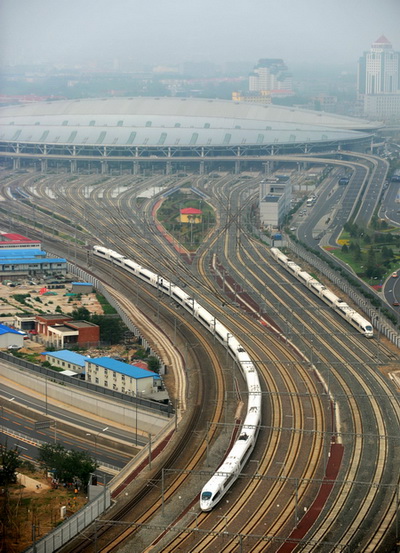High-speed rails under construction may cost 850b yuan
Updated: 2011-07-27 15:05
(Xinhua)
|
|||||||||||
|
 The first commercial bullet train set off from Beijing South Railway Station on the Beijing-Shanghai High-Speed Railway, in Beijing, capital of China, June 30, 2011.[Photo/Xinhua] |
BEIJING -- China's high-speed rails under construction may cost up to 849.1 billion yuan ($131.79 billion), a brokerage firm estimates, after a train crash triggered financial concerns over the sector.
About 26 high-speed rail lines, including the Nanjing-Hangzhou, Beijing-Shijiazhuang and Harbin-Dalian routes, are currently being constructed, said a report released by GF Securities on Tuesday.
The railways ministry has spent 589.8 billion yuan in building 13 high-speed rail lines that are currently in operation, with another 23 more lines awaiting construction, according to the report.
"The outlined investment scale is hard to achieve, so there might be a reduction," said an analyst who didn't want to be identified.
According to the Ministry of Railways, it plans to expand its investment for railway construction to 745.5 billion yuan this year, while its debt stands at 1.8 trillion yuan.
"The train accident will undoubtedly increase the financing difficulty for the sector, and there's a risk of the cash chain being ruptured," said Zhao Jian, a professor with Beijing Jiaotong University.
But Cheng Zhou, a fund manager with the Guotai Jinma Sustaining Return Fund, said the growing pace of the sector's investment may slow in the short term, but the plan to develop high-speed trains won't be called off.
"In the long run, the government still needs to develop the sector but will raise standards for the construction, safety and supervision," Cheng said.
During the past two trading days, 33 railway-related stocks listed on the Shanghai Stock Exchange lost 60 percent, or 37.6 billion yuan of their total market value.
A high-speed train rear-ended another Saturday evening in the eastern province of Zhejiang. The accident, which has left at least 39 dead, has raised public doubts on transportation safety, sinking the ministry into a deep trust crisis .